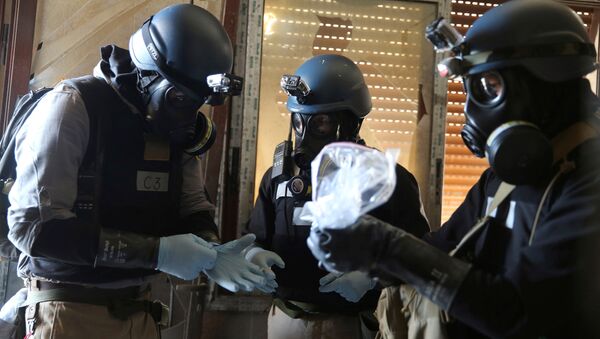MOSCOW (Sputnik) – The probe into the use of chemical weapons in Syria is a highly politicized issue, therefore the methodology used by the Joint Investigative Mechanism (JIM) of the Organization for the Prohibition of Chemical Weapons (OPCW) and the United Nations requires proper examination, and Russia's call to delay the prolongation of the panel's mandate until their latest report has been studied is reasonable, experts told Sputnik.
Politicization of Chemical Attacks
Russia's veto was slammed by numerous Western states. In particular, the German Foreign Ministry said that the move was the equivalent of granting impunity to those who used chemical weapons in Syria. France has also spoken out about the veto, with the Foreign Ministry saying that while regretting the move, Paris urged the international community to continue a dialogue with Russia.
Executive Director of the Council for the National Interest and former CIA officer Philip Giraldi told Sputnik that the probe into chemical weapons use in Syria had been strongly politicized and investigators' methodology had to be properly studied.
"The issue has been so heavily politicized that there has to be some clarity regarding what has been learned so far before proceeding. There also has to be some examination of the methodology being pursued … Russia has never indicated in any fashion that it is indifferent to the use of chemical weapons. In this case, Russia is indicating that the investigation is itself not being conducted objectively," Giraldi said.
READ MORE: Russia Vetoes UNSC Resolution on Probing Syria Chemical Attacks
Meanwhile, White House Press Secretary Sarah Huckabee Sanders has accused Russia of having a lack of concern about ending chemical attacks in Syria, while UK Foreign Secretary Boris Johnson expressed his disappointment over Russia’s decision, suggesting that JIM would now stop existing. In turn, the Russian Foreign Ministry strongly criticized attempts by some Western countries to distort Moscow's position on the extension of the OPCW-UN probe into alleged use of chemical weapons in Syria. Moscow, in particular, called on Washington to "show at least minimal decency."
Alessandro Bruno, an analyst at Toronto-based advisory firm Lombardi Letter and former UN officer in North Africa, called Russia's move logical, in part, due to the politicization of the allegations related to chemical weapons use.
"The Russian proposal, which demands the investigation proceed without first 'designating whom the guilty parties' a priori is entirely sensible as the correct course… The chemical weapons issue has become much more about achieving these geopolitical goals than condemning the use [of] chemical weapons [in] itself," Bruno said.
Ibrahim Al-Assil, a fellow at the Middle East Institute, argued, however, that the veto prevented the international community from learning the truth about the chemical attacks.
"The veto sends negative signals on multiple levels: it's negative for the potential of the international community to cooperate to solve the Syrian conflict, it's negative for Syrians because it blocks a route for them to know the truth, and it's negative for justice because it hinders holding war criminals accountable," Al-Assil said.
Chemical Weapons as Means to Achieve Goals
According to Bruno, some Western countries have used the chemical weapons issue to achieve their own geopolitical goals.
"There is the other issue that the West continues to pursue regime change in Syria. Having lost the military war, they are going after that popular canard that was 'so successful' in Iraq: chemical weapons or WMD [weapons of mass destruction] … The British and the Americans have often played the 'chemical weapons' card to justify interventions," Bruno said.
Bruno pointed out that Johnson's hasty condemnation of Damascus over the April chemical attack in the settlement of Khan Sheikhoun in Syria's Idlib province, hours after the first reports appeared, was "reason enough to demand that a proper and full investigations without prejudice of guilt be conducted before any report can be made."
READ MORE: Russia Tends to Think Chemical Attack in Syria's Khan Sheykhoun Staged
The expert also noted that Washington's accusations of the Syrian government over the use of chemical weapons served to damage Damascus' position and thus create a favorable situation for the Kurds, an ethnic minority that is a US ally in the region.
Khan Sheikhoun Incident
In early April, the National Coalition for Syrian Revolutionary and Opposition Forces reported a chemical attack in the village of Khan Sheikhoun, which claimed lives of 80 people and wounded another 200. Several days later, the Pentagon ordered a strike on the Shairat airbase with cruise missiles, claiming that Syrian government's planes took off from this base on April 4 to drop bombs containing sarin gas on Khan Sheikhoun.
Damascus has denied involvement in the Idlib incident, while the Syrian army said it did not possess chemical weapons since the nation's chemical arsenal had been destroyed, as confirmed by the OPCW in January 2016. Following the incident, Russia called for an "open and transparent" investigation into the Idlib events.
READ MORE: Russia Vetoes UNSC Resolution on Probing Syria Chemical Attacks
In June, the OPCW said that its fact-finding mission confirmed that man-made chemical sarin, a gas used as a chemical weapon, was used in Khan Sheikhoun, but did not determine the responsible party.
According to Giraldi, the results of the JIM probe, which are expected to be part of the upcoming report, could not be considered reliable, since investigators had no chance to visit the site of the chemical weapons incident to obtain data.
"The conclusions cannot be relied upon since the site has not been visited and has been controlled by the so-called rebels who have a stake in blaming it on the Syrian government. The whole process has been political and does not reflect any honest scientific analysis of the information available," Giraldi said.
He added that the samples obtained for investigation "could have come from anywhere and they are not reliable."



